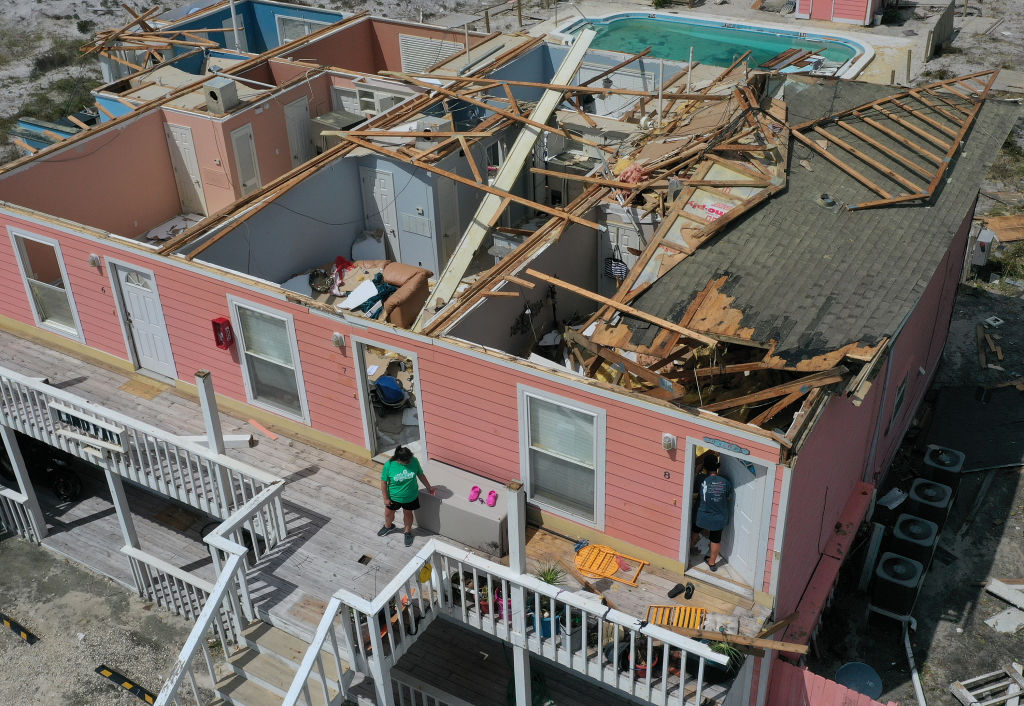
As the June 1 start of hurricane season approached last week, Florida lawmakers raced to address a crucial gap in the state’s coastal defenses: property insurance. Insurance markets in the state are in crisis, with premiums skyrocketing and many homeowners unable to find companies willing to insure their homes against damage. Part of the problem is fraud and abuse that increases costs for everybody and puts insurers out of business. But climate change is also playing an important part in the state’s insurance disaster, even though it hasn’t gotten much airtime in local news coverage, or in pronouncements from the state’s Republican leadership.
Climate change is already contributing to stronger, more destructive hurricanes, a trend that will only worsen as the planet continues to warm. For Florida homeowners, that means rising insurance costs (about 25% in the last year, according to the Insurance Information Institute, an industry association) as their risk of damage goes up and insurers pay out more and more to rebuild homes after each disaster—a mechanism that functions like a stealth tax on climate risk. “What you pay in insurance is sending you a message about your vulnerability,” says Lynne McChristian, director of the Office of Risk Management & Insurance Research at the University of Illinois Urbana-Champaign. “There is a price to be paid for living in what is arguably the most vulnerable natural disaster location in the U.S.”
Catastrophic losses from hurricanes drove most of the big national insurers out of the Florida property insurance market in recent decades, and they were replaced by small local players, which are more vulnerable to the whims of the market for reinsurance (essentially insurance for insurance companies) which they need to back them up if a big storm hits and they have to pay up. The smaller companies are also at greater risk of going under due to the tides of non-climate related litigation common to the industry, that firms with less of a war-chest can’t withstand—as well as the fact that storms create more opportunities for actors to take advantage of the system, like contractors that cruise neighborhoods looking to repair roofs that may or may not have been damaged, and charging insurance companies for the work. “Companies have a really difficult time when it’s just storms, and the companies have a really difficult time when it’s just fraud,” says Charles Nyce, associate director of the Center for Risk Management Education and Research at Florida State University. “But when it’s storms and fraud, which is what we’ve had over the last few years, they can’t survive.”
A version of this story first appeared in the Climate is Everything newsletter. To sign up, click here.
For now, sputtering insurance markets are mostly a Florida problem. But as climate change accelerates, those woes could spread to other states: an unwelcome addendum to increased risk of disasters like floods and wildfires. Damage caused by extreme weather events is already jacking up insurance costs in other parts of the country, like the Gulf states and California, and big national insurers could even pull out of newly disaster-prone areas, leaving more states in Florida’s same tenuous insurance situation.
At the same time, the industry is in some sense playing against its own climate self interest, undermining policy meant to address global warming and underwriting fossil fuel projects that could increase risks to homes that they also insure. Last month, climate think tank Influence Map released a report accusing the U.S. insurance industry of working to delay and weaken new state and federal climate regulations. Some of that policy opposition has been insurance companies trying to avoid disclosing to regulators how they were planning to address climate risks to their businesses. Meanwhile, the industry has been actively working to avoid disclosing how much it has been investing in and underwriting fossil fuel projects—for example, the American Property Casualty Insurance Association, a trade group, helped tank a California bill earlier this year requiring companies make those types of disclosures. “The fact that [the regulations are] so new, and industry associations are jumping on it already and trying to slow it down: that’s important,” says Cleo Rank, a policy analyst at Influence Map. “That will determine if we see more regulation like this.”
In Florida, just last week approved a $2 billion state-backed reinsurance fund and new legislation limiting the amount that attorneys can collect for suing insurance companies. That may help bring down costs in the near term, but they won’t do much to change the longer term pattern of more frequent and intense hurricanes battering an increasingly populated Florida coast, and the growing cost of rebuilding after those disasters.
Experts say we must prepare for what a warming world will throw at us. One longer term answer would be to relocate from climate-vulnerable areas, but so far there hasn’t been much appetite for that. Another option is to upgrade homes and buildings in advance, which in theory would limit future hurricane damage and thus reduce insurance payouts. That seems to be where Florida is heading: one line item in one of the new bills, for example, gives Florida homeowners up to $10,000 to make home improvements like installing new doors and roofs. “We haven’t figured out a way to stop a hurricane yet,” says Nyce. “That means, when it hits, you have to be resilient. That means hardening homes.”
More Must-Reads from TIME
- Donald Trump Is TIME's 2024 Person of the Year
- Why We Chose Trump as Person of the Year
- Is Intermittent Fasting Good or Bad for You?
- The 100 Must-Read Books of 2024
- The 20 Best Christmas TV Episodes
- Column: If Optimism Feels Ridiculous Now, Try Hope
- The Future of Climate Action Is Trade Policy
- Merle Bombardieri Is Helping People Make the Baby Decision
Write to Alejandro de la Garza at alejandro.delagarza@time.com